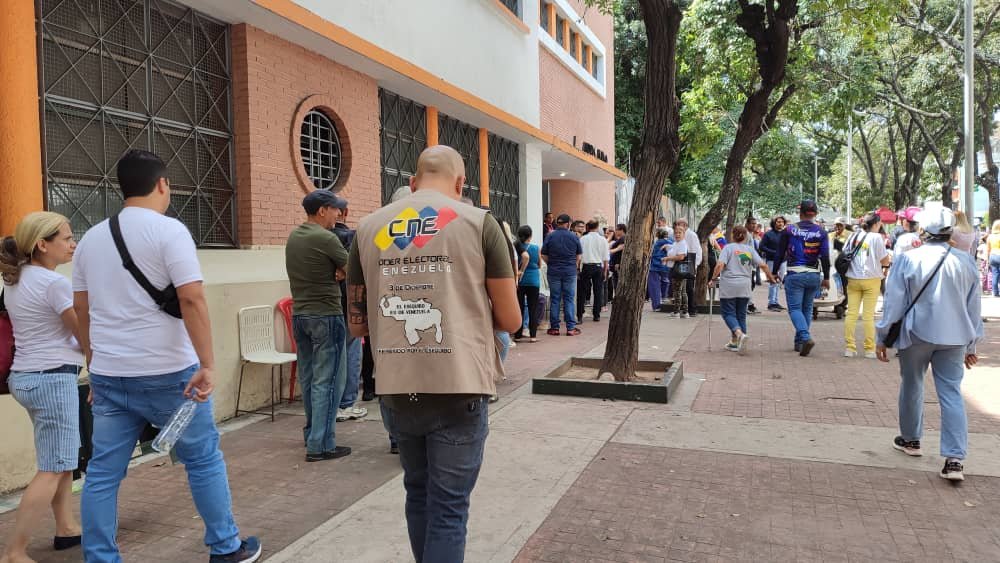Venezuela’s National Electoral Council (CNE) has carried out a “successful” dry-run to prepare for the December 3 referendum intended to measure popular support over the country’s centuries-long claim over the Essequibo Strip.
On November 19, Venezuelans participated in an electoral simulation drill with 800 voting centers opened nationwide, which registered long queues throughout the day. The ballot had five questions regarding the country’s territorial dispute with neighboring Guyana over the 160,000 square kilometer resource-rich Essequibo region.
According to electoral authorities, the voting exercise “tripled the number of votes of any past simulation carried out in Venezuela”. In a press release, CNE also praised the “joyful, civic and peaceful” behavior of Venezuelans without specifying turnout numbers.
“We are fully prepared for the non-binding referendum on December 3 in defense of our Essequibo territory. Any technical issues that could occur in this type of event have been corrected,” CNE President Elvis Amoroso told the press.
“The simulation has been a success,” added CNE Vice President Carlos Quintero.
For his part, Venezuelan President Nicolás Maduro assured that more than 3 million people participated in Sunday’s electoral rehearsal while an additional half million went to a voting center to find out about the process and help spread information. The country’s current electoral roll has over 20 million people registered.
Maduro went on to add that the dry-run confirmed that Venezuela “has a strong electoral system,” which provides guarantees, security, transparency, high technology, and audits before, during and after the voting process. “Everything worked,” he stated.
Venezuela and Guyana’s dispute over the Essequibo Strip dates back to colonial times and remained dormant for years until Texas-based ExxonMobil found significant oil reserves in the region in 2015. Since then, the Guyana government, presently led by President Irfaan Ali, has expanded a bidding process for oil exploration in Essequibo’s undelimited territorial waters, which Caracas argues violates the unresolved legal battle.
Guyana claims that an arbitration award in 1899 granted the Essequibo Strip to the United Kingdom, the country’s former colonial power. Venezuela has said the decision is illegitimate due to the absence of Venezuelan negotiators and defends the 1966 UN-brokered Geneva Agreement which called for a negotiated solution between the two countries following Guyana’s independence that same year.
In 2018, Georgetown requested the International Court of Justice (ICJ) to confirm the validity of the border drawn by the 1899 Paris tribunal. Caracas protested stating that the Hague-based court has no jurisdiction over the matter, but the argument was dismissed.
Read more: Venezuela urges diplomatic resolution to Essequibo dispute with Guyana, condemns US attempts to militarize region
On November 13, representatives of both nations were summoned to ICJ headquarters after Guyana asked the court to suspend Venezuela’s upcoming referendum. During the hearing, Venezuelan Vice-President Delcy Rodríguez defended the country’s right to carry out an electoral process for people to voice their opinion on the territorial controversy and rejected foreign interference in the nation’s internal affairs.
“We are really very surprised because not only are they [Guyana] the heirs of a territory that the UK had stolen from Venezuela, but they also inherited that imperialist and colonialist arrogance,” Rodríguez said in an interview with Venezuelan state television from The Hague.
The December 3 consultation will ask Venezuelans whether they reject the 1899 arbitration, approve of the 1966 agreement as the only binding mechanism to resolve the issue, agree with not recognizing the ICJ’s jurisdiction, and oppose Guyana’s unilateral appropriation of the Essequibo’s territorial waters for oil exploration.
A final question asks voters if they agree with establishing a new state, called Guayana Esequiba, in the disputed strip, while granting Venezuelan citizenship to its inhabitants and implementing social programs for the roughly 125,000 people living there.
The Guyana government has taken special issue with the last referendum question, stating it paves the way for the “unilateral and illegal” annexation of the Essequibo territory.
Paul Reichler, one of the lawyers representing Guyana at The Hague, told the court that “military preparations were already underway” to enforce the referendum result.
Venezuela’s Rodríguez said these claims were false and clarified that the recent military mobilization was related to the December 3 vote. During electoral events, the South American nation always deploys a special military operation called “Plan Republica” to safeguard voting centers.
Additionally, the referendum is not a binding instrument and will not have an impact on the legal battle for the Essequibo Strip. Some analysts assume the vote is to weigh popular support and establish a potential key campaign topic ahead of the 2024 presidential elections.
In turn, Caracas has accused the Guyana government of joining forces with the US Southern Command, threatening regional stability, and receiving funding from ExxonMobil to carry out the legal procedure before the ICJ in exchange for oil exploration licenses.
“We reject the 150 years of abuses by the British empire, now by ExxonMobil and the US Southern Command. Venezuela will be respected,” said President Maduro on Tuesday during a meeting with high school and university students.
The Venezuelan leader also accused ExxonMobil of “paying its opposition employees” inside and outside Venezuela to sabotage the referendum.
“A lot of money is flowing from ExxonMobil to buy far-right politicians, for them to go out and sabotage the referendum,” said Maduro during a meeting on Wednesday with the Bolivarian National Armed Forces (FANB) in Caracas.
Maduro confirmed that Venezuelans will go out to vote on December 3 to defend their “historical right” over the Essequibo Strip.
This was first published at Venezuela Analysis.





